47 results
Chapter 4 - ‘Habit’s Afterlife’
-
- Book:
- Seamus Heaney and Catholicism
- Published online:
- 20 February 2025
- Print publication:
- 27 February 2025, pp 122-152
-
- Chapter
- Export citation
Chapter 8 - Pallinodes and Eidola
- from Part IV - The Long Imagist Poem
-
- Book:
- Modernist Hellenism
- Published online:
- 21 November 2024
- Print publication:
- 28 November 2024, pp 393-463
-
- Chapter
- Export citation
5 - Medieval Imperialism
-
- Book:
- Nations before the Nation-State
- Published online:
- 14 November 2024
- Print publication:
- 21 November 2024, pp 103-130
-
- Chapter
- Export citation
Chapter 7 - Renaissance
- from Part II - Pan-European Moods and Movements
-
-
- Book:
- Europe in British Literature and Culture
- Published online:
- 06 June 2024
- Print publication:
- 13 June 2024, pp 119-132
-
- Chapter
- Export citation
Chapter 6 - Cultural Borrowings
- from Part II - Writing the Nation
-
-
- Book:
- The Nation in British Literature and Culture
- Published online:
- 20 July 2023
- Print publication:
- 10 August 2023, pp 107-121
-
- Chapter
- Export citation
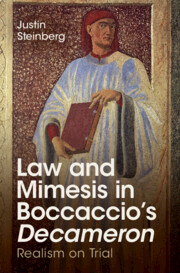
Law and Mimesis in Boccaccio's Decameron
- Realism on Trial
-
- Published online:
- 07 August 2023
- Print publication:
- 01 June 2023
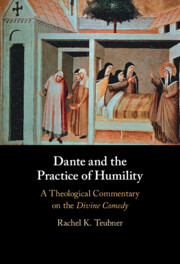
Dante and the Practice of Humility
- A Theological Commentary on the Divine Comedy
-
- Published online:
- 29 June 2023
- Print publication:
- 13 July 2023
Chapter 6 - The Author on Trial
-
- Book:
- Law and Mimesis in Boccaccio's Decameron
- Published online:
- 07 August 2023
- Print publication:
- 01 June 2023, pp 192-218
-
- Chapter
- Export citation
Chapter 19 - The World of the Surrealist Novel
- from IV - Transnational Surrealism
-
-
- Book:
- A History of the Surrealist Novel
- Published online:
- 02 February 2023
- Print publication:
- 16 February 2023, pp 330-347
-
- Chapter
- Export citation
Chapter 4 - Purgatory and Pause – Shakespeare, Dante and the Lobster
-
- Book:
- Shakespeare and Beckett
- Published online:
- 19 January 2023
- Print publication:
- 26 January 2023, pp 97-122
-
- Chapter
- Export citation
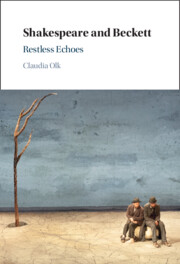
Shakespeare and Beckett
-
- Published online:
- 19 January 2023
- Print publication:
- 26 January 2023
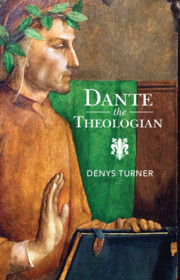
Dante the Theologian
-
- Published online:
- 02 September 2022
- Print publication:
- 22 September 2022
Afterword
-
-
- Book:
- Literary Beginnings in the European Middle Ages
- Published online:
- 11 August 2022
- Print publication:
- 25 August 2022, pp 299-312
-
- Chapter
- Export citation
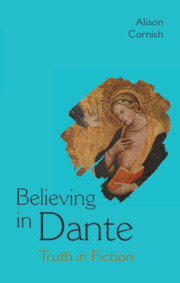
Believing in Dante
- Truth in Fiction
-
- Published online:
- 10 June 2022
- Print publication:
- 30 June 2022
2 - Eternal Hope: The Christian Vision
-
- Book:
- Hope: A Literary History
- Published online:
- 27 January 2022
- Print publication:
- 27 January 2022, pp 72-113
-
- Chapter
- Export citation
Chapter 6 - The Advent of the Nothing
- from Part II - Theology’s Cultural Mode of the Sacred
-
-
- Book:
- Sacred Modes of Being in a Postsecular World
- Published online:
- 07 September 2021
- Print publication:
- 16 September 2021, pp 122-134
-
- Chapter
- Export citation
Chapter 2 - Unity in Variety
-
- Book:
- Georg Simmel and German Culture
- Published online:
- 07 July 2021
- Print publication:
- 15 July 2021, pp 90-144
-
- Chapter
- Export citation
Chapter 25 - Heaney in Between
- from VI - Critical Contexts
-
-
- Book:
- Seamus Heaney in Context
- Published online:
- 15 March 2021
- Print publication:
- 01 April 2021, pp 276-285
-
- Chapter
- Export citation
Chapter 18 - Translation
- from IV - Publishing
-
-
- Book:
- Seamus Heaney in Context
- Published online:
- 15 March 2021
- Print publication:
- 01 April 2021, pp 198-208
-
- Chapter
- Export citation

